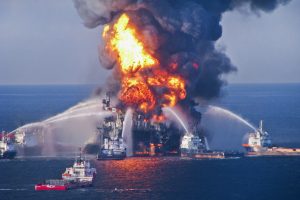Sensationalism and Slow Violence in Gulf Oil Spills
By: Alison Gouveia, Charlie Reisman, and Matt Walker
Big oil spills are often very present in the public conscience. Everyone knows the dramatic stories of the Exxon Valdez (1989), and the 2010 BP oil spill in the Gulf of Mexico. Many of you may have even seen Peter Berg’s big-budget film based on the latter, Deepwater Horizon (2016), featuring explosions and a heroic Mark Wahlberg. However, many of you may not know about the Taylor Energy oil spill. It is potentially the largest spill in US history and has been pouring oil into the Gulf since 2004, but because it never had a big explosion, it never reached the limelight.
Public awareness of environmental events like these oil spills is determined by media coverage that hunts almost exclusively for spectacular stories while sometimes overlooking “less sexy” stories that are no less important. This process of sensationalism can smother issues of slow violence, events with detrimental effects that carry out over long periods of time. By comparing the BP spill and the current Taylor Energy spill, we will evaluate the impacts on vulnerable communities and ecosystems, as well as evaluate the role of sensationalism by the media in public attitude towards these events.
Keywords: “Sacrifice Zones”, “Slow Violence”
Table of Contents:
Background on Taylor Energy and BP Oil Spills
Psychological Impacts on Communities
